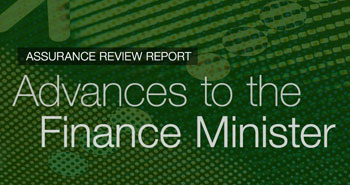Browse our range of reports and publications including performance and financial statement audit reports, assurance review reports, information reports and annual reports.
ANAO COVID-19 multi-year audit strategy
1. A variety of funding and delivery mechanisms were employed by the Australian Government to address the immediate health and economic needs arising from the COVID-19 pandemic. These included income support payments, grants, procurements, loans and tax relief.
2. The following sections set out how the ANAO responded in its audit program to the impact of the COVID-19 pandemic on the risk environment faced by the Australian public sector.
Performance audit
3. In line with the objectives of the ANAO’s Annual Audit Work Program, the ANAO’s strategy for auditing COVID-19 related measures was designed to: respond to the interests and priorities of the Parliament of Australia; provide a balanced program of activity that was informed by risk; and promote accountability and transparency of, and improvements to, public administration. The ANAO’s strategy evolved over time as the government announced new initiatives or adjusted existing policies to address the changing pandemic situation and its impact on citizens and the Australian economy.
4. The ANAO’s multi-year strategy for COVID-19 performance audits focused on the effective, efficient, economical and ethical delivery of the Australian Government’s response to the COVID-19 pandemic. This included the economic stimulus and social support packages as well as the management of related risks, such as system and technology changes, fraud, information management, privacy, compliance and regulatory effectiveness. The strategy was delivered in three phases.
Phase 1 audits
5. Five COVID-19 specific audits were completed in 2020–21, examining key aspects of the Australian Government’s early response to the COVID 19 pandemic.
- Two audits examined how the Australian Taxation Office and Services Australia: managed and responded to risks related to rapid development and implementation of COVID-19 measures and the impact on business as usual activities and controls; and communicated and implemented revised risk tolerances across the business.
- Two audits focused on the National Medical Stockpile. The audits reviewed the procurement and deployment of personal protective equipment and medical devices to support the early response to the COVID-19 pandemic.
- There was also an audit of the effectiveness of the approach taken to position the Australian Public Service to quickly and efficiently implement new response measures and deliver government policy, including coordination and communication across the public sector and the deployment and management of resources.
Phase 2 audits
6. This phase of the audit program focused on the three main stages of program delivery: policy design; implementation; and performance assessment, evaluation and dissemination of lessons learnt. Along with an ongoing focus on risk management, areas of public administration examined during this phase of the audit program were:
- governance arrangements and coordination within and across entities;
- preparedness and planning;
- fraud, compliance and system controls in high volume processing programs;
- proper use of public resources, including achieving value-for-money, in the procurement of goods and services to support the government’s response;
- regulatory responses, such as in border protection and biosecurity;
- information and communication services to citizens;
- financial assistance to individuals and to support the economy;
- grants to industry, communities and individuals;
- performance measurement and progress towards achieving intended policy objectives; and
- planning for and implementation of transition to business as usual.
7. Seven performance audits were completed under this phase in 2021–22 and 2022–23, examining: international travel restrictions during COVID-19 (December 2021); human biosecurity for international air travellers (March 2022); administration of the JobKeeper scheme (April 2022); management of the return of overseas Australians (June 2022); COVID-19 support to the aviation sector (June 2022); Australia’s COVID-19 vaccine rollout (August 2022); and the expansion of telehealth services (January 2023).
Phase 3 audit
8. In the final phase of the COVID-19 performance audit program, the ANAO examined the Australian Government’s readiness to respond to crises. The ANAO conducted one audit under phase 3.
Assurance reviews – Advances to the Finance Minister
9. The Advance to the Minister for Finance (AFM) is a provision in the annual Appropriation Acts which enables the Minister for Finance (Finance Minister) to provide additional urgently needed appropriation to agencies for expenditure in the current year. The Finance Minister may only agree to issue an AFM if satisfied that there is an urgent need for expenditure that is either not provided for or has been insufficiently provided for in the existing appropriations of the agency.
10. The ANAO undertook seven assurance reviews of the AFM from April 2020 to October 2020, which were tabled in Parliament. These reviews were conducted in accordance with section 19A of the Auditor-General Act 1997. They provided timely assurance to the Parliament about the AFM, which significantly increased to support Australian Government activities during the COVID-19 pandemic.
11. In 2021–22, COVID-19 pandemic and recovery advances totalling $1.807 billion were provided to the Department of Finance and the National Recovery and Resilience Agency for: Construction of Centres for National Resilience; Pandemic Leave Disaster Payment. There were no advances in 2022–23.
Impact on the ANAO’s non-COVID-19 specific audit program
Performance audit
In addition to COVID-19 performance audits, other ANAO performance audits examined aspects of the government’s response to COVID-19 where the response measures were considered to have impacted on the program being audited. For example, an audit that examined an entity’s approach to risk management included a review of the entity’s management of risks emerging as a result of COVID-19, its development of revised risk tolerances given the need to reprioritise resources to COVID-19 related tasks and the impact of this on compliance or other activities related to the audited program.
Financial statements audit
The COVID-19 pandemic presented new key risk areas for the operations and financial statements preparation processes of the entities that the ANAO audits. The ANAO regularly reassessed risk in light of the operating environment arising from COVID-19 response measures and the associated stimulus measures.
Auditor-General performance audit reports covering related topics
- Auditor-General Report No. 6 of 2007–08, Australia's Preparedness for a Human Influenza Pandemic
- Auditor-General Report No. 27 of 2007–08, Emergency Management Australia
- Auditor-General Report No. 46 of 2008–09, Business Continuity Management and Emergency Management in Centrelink
- Auditor-General Report No. 36 of 2009–10, Emergency Management and Community Recovery Assistance in Centrelink
- Auditor-General Report No. 24 of 2013–14, Emergency Defence Assistance to the Civil Community
- Auditor-General Report No. 53 of 2013–14, Management of the National Medical Stockpile
- Auditor-General Report No. 34 of 2014–15, Administration of the Natural Disaster Relief and Recovery Arrangements by Emergency Management Australia
- Auditor-General Report No. 57 of 2016–17, Department of Health’s Coordination of Communicable Disease Emergencies
In addition, Rapid implementation of Australian Government initiatives (August 2020) lists Auditor-General reports that identified key learnings relating to rapid program design and implementation practices and/or responses to the Global Financial Crisis.


